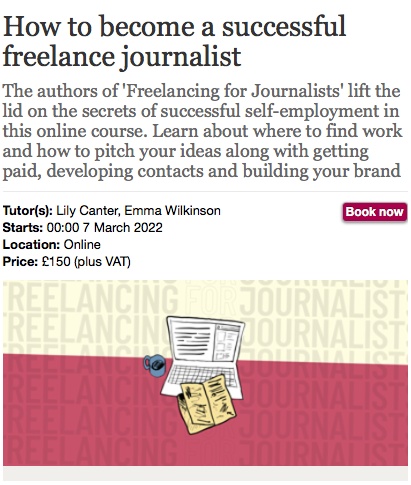When we did our podcast episode on ghosting (how to deal with an editor ignoring your emails), an editor got in touch with us to say could we talk about all those times freelancers stop responding. She said she had lost count of the number of freelancers she had been in contact with about work who then disappeared into the ether.
This is not the first time editors have told us this and we have also experienced this unreliability when working on collaborations or projects. It made us wonder - to what extent can you stand out as a freelancer simply by doing what you said you were going to do? If editors are expecting to be let down, could simply being reliable push you to the top of their favourite freelancer list?
We do talk about this in our book although when we were planning what to include, it seemed so basic. But get the basics right and the rest is more likely to fall into place. Leaving a trail of frustrated editors in your wake will only make your life harder in the long run. So here’s our top tips for being reliable.
Know your deadlines
When an editor gives a deadline, it’s there for a reason. While there may be some slight wriggle room depending on the publication, there is also the possibility that you missing your deadline leaves the editor with a big space to fill at short notice. FFJ co-founder Emma has been that editor, commissioning monthly news items on a specialist magazine only to have to write one herself at the last minute after a piece did not materialise. Guess who she did not commission the next month. Also if the editor has to chase you that is an extra job on their to-do list which is already likely to be very long.
Communicate
Things don’t always go to plan. A case study might drop out or suddenly stop responding, a key interview might have to be rearranged at the last minute. Perhaps the article is not what you thought it was and more work is needed to uncover what’s happening. Illnesses happen. All these things are par for the course, but the key is to keep your editor in the loop and explain what’s going on. Ask if there is any flexibility in the deadline and provide reassurance that things are in place. Also try to go to editors with solutions not problems. For example, details of the replacement case study you have already found.
Be realistic
We know as freelancers that it is all too easy to say yes to every commission and work out later how you will get them all done. Saying no to work seems like the worst thing to do. But if you have no chance of meeting multiple deadlines all on one day or if your week is already completely full, saying no could prevent you from letting an editor down later. It may be that you can negotiate a longer deadline at the start. Editors will understand if you explain how busy you are. Again the worst thing you can do is say a quick yes and then bury your head in the sand as all the deadlines are missed.
Meet the brief
Make sure you get a clear brief of the commission at the start which includes as a very minimum word count and deadline (and of course fee). Miscommunication at this point may lead to you inadvertently letting someone down by not delivering what they expected. If there’s anything you’re unsure of ask, but also look at the style of article the organisation would usually publish so you’re clear what it is you should be aiming for. If they ask for a case study, fact box or photo for example, make sure you provide these so they don’t have to keep chasing you after. Have that brief open as you’re writing so you’re clear on what it is you are aiming for.
Start early
If a deadline is a few weeks away, it is tempting to move that to the bottom of the to-do list. Then all of a sudden, you’re a couple of days away from having to file it and you haven’t done any interviews. Get a plan in place early including hunting down case studies and getting other interviews in place. This can take time so doing that work early on will reduce the chance of panic as the deadline looms. Also if there is time in the schedule, you can always aim to complete the piece a day or two early to give you some breathing space should problems arise.
What’s coming up
Our four-week online course with journalism.co.uk on How to be a successful freelance journalist starts again on Monday 7th March so if you’re quick you can still grab your spot. This is very practical, done in your own time and with tons of feedback from us through out dedicated Slack group.
We go through everything from finding opportunities, to developing ideas and pitching, to branding and networking. If you have any questions about it do get in touch.
There are still some slots for the next round of our Journalism Work Experience Initiative. To access the scheme you need to sign up for the webinar on the 30th March (recordings are available) which then gives you 12 months of access to a database of remote work experience opportunities with experienced journalists. Bursary places are available - just email us to find out more.
Triumph of the week
Starting to record series 7 of the podcast! Very excited to bring you some great episodes and guests.
That feeling when
You really need to get up extra early to get through everything you need to do today but you just keep hitting that snooze button.
We love to hear your feedback on everything we do, so feel free to drop us an email anytime at freelancingforjournalists@gmail.com
Bye for now!









